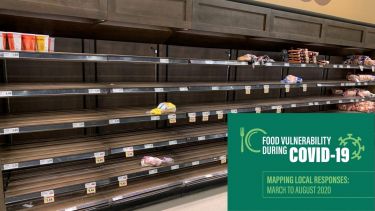The new reports are part of the Food vulnerability during COVID-19 project which is funded by the Economic and Social Research Council (ESRC) as part of the UK Research and Innovation’s rapid response to COVID-19. The collaborative project is led by Dr Hannah Lambie-Mumford from the University of Sheffield and Dr Rachel Loopstra from King’s College London, in partnership with Simon Shaw from the food and farming charity Sustain.
The reports draw on 14 in depth qualitative case studies of local authority areas in England, Northern Ireland, Scotland and Wales. The research highlighted the unprecedented scale of local responses to food access issues between March – August 2020, the period of the first UK lockdown. The local responses included work by new and existing food providers from across different sectors; working practices were overhauled and extensive partnership and collaborative working took place. There were levels of funding for food provision that have not been seen in recent times and new groups of volunteers, organisations and companies became involved in food support for the first time. Across this range of actors, partnership working and working together was a key enabler of responses.
The reports published today are:
- A detailed comparative report presenting findings from a cross-case analysis of 14 local case studies, and an accompanying executive summary of the report.
- Eight case study reports that map local responses in Argyll and Bute, Belfast, Cardiff, Derry and Strabane, Herefordshire, Moray, Swansea, West Berkshire.
- A methodological appendix setting out the research methods that were undertaken in each local area case study.
- A full report on local responses to household food insecurity during COVID-19 across the UK which includes all case studies, cross case analysis and the methodological appendix.
The new research raises key questions looking ahead including, what are the longer-term legacies of this period? For example, what impact will the significant increase in direct food aid provided during March-August 2020 have on pre-pandemic calls to move away from large scale food aid as a first response to food insecurity?
Find out more about the Food vulnerability during COVID-19 project.

